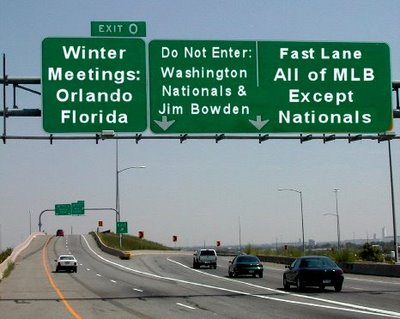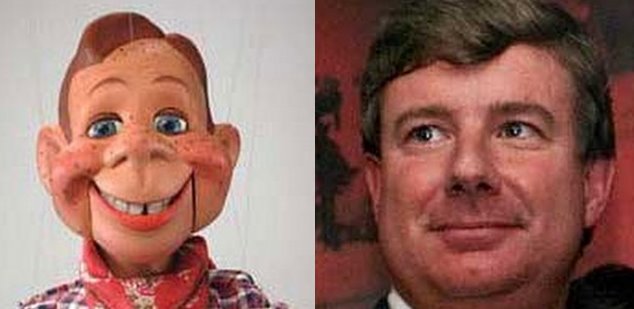SUPPORTING THE PLAN
 [December 4th] -- No, I'm not better, but I thought I should post one more time before I die. Or so it feels, anyway.
[December 4th] -- No, I'm not better, but I thought I should post one more time before I die. Or so it feels, anyway.
The Nationals blog-o-sphere was ablaze with Barry Svrluga's doomsday-esque article that appeared to paint a pretty bleak short-term future for the Washington Nationals. Many sites used the article as a "See there, I told you so!" while others saw it more like JFK's quote after meeting Khrushchev in Vienna: "It's going to be a cold winter." I see it this way:
"What did you expect?"
Since day one, Stan Kasten laid out a future for the team that included exactly what's happening now, that the team would forgo any semblance of free agency or long-term contracts while stocking the farm system for the future. He promised us that any savings reaped by a "less mature" major league roster would be reinvested in the baby Nats. Thus far, he has shown us to be true to his word, even to the point of being devious. How else would you explain, literally hours before Jose Guillen signed with the Mariners, the Nationals' decision to offer him arbitration? Throug h a totally meaningless administrative detail - bingo - another sandwich pick. Kasten (through his Howdy-Doody look-a-like puppet) has asked, rhetorically, what good does a $3 million dollar pitcher do for the Nationals when we need to find out if our young kids can pitch? Does it matter if we win 71 games, or will 61 wins place the team any deeper in the cellar.
h a totally meaningless administrative detail - bingo - another sandwich pick. Kasten (through his Howdy-Doody look-a-like puppet) has asked, rhetorically, what good does a $3 million dollar pitcher do for the Nationals when we need to find out if our young kids can pitch? Does it matter if we win 71 games, or will 61 wins place the team any deeper in the cellar.
As you've known all summer, I subscribe to this theory. In fact, I think I advocated the idea before Kasten did. I'd be happy to trade Nick Johnson, Brian Schneider and Austin Kearns for pitching prospects NOW, because none of those three would help the team win before their contracts are up. The team just doesn't have enough of a supporting cast. What the Nationals are doing makes sense.
And remember, Kasten has a track record.
Kasten took over the Atlanta Braves in 1986, but really didn't begin to make his mark on the team until a year later. After an period of mediocrity in the early 1980's, the Braves' record looked like this under Kasten's initial direction:
- 1987: 69-92
- 1988: 54-106
- 1989: 63-97
- 1990: 69-94
They won the NL East the next year, and for the next fourteen full seasons after that.
The Braves farm system, while not as bereft of talent as the current Nationals, was marginal at best. On that first division winner, there were five players drafted before Kasten t ook over (Ron Gant ['83], Dave Justice ['85], Jeff Blauser ['84], Tom Glavine ['84] and Mark Lemke ['83]). I'd guess that, five years from now, the Nationals' farm system will provide far more than five players on that 2011 team.
ook over (Ron Gant ['83], Dave Justice ['85], Jeff Blauser ['84], Tom Glavine ['84] and Mark Lemke ['83]). I'd guess that, five years from now, the Nationals' farm system will provide far more than five players on that 2011 team.
That first team was very similar in composition to today's Nationals. They had a solid veteran catcher (Ozzie Virgil), a 28 year old hard-hitting first baseman (Bob Horner), a slugging outfielder who had just turned 30 (Dale Murphy) and a bunch of veteran pitchers who never made a real impact in the major leagues.
Slowly, Kasten began to peel away the slices that weren't going to help the team win in the future. Bob Horner was allowed to depart through free agency. Doyle Alexander, one of their few "real" pitchers, was traded to Detroit for some kid no one ever heard of. That, of course, turned out to be John Smoltz. Even Dale Murphy, Mr. "Atlanta," was traded away for prospects. When the team felt confident that they could no longer fill any holes from within, the Braves went onto the free agent market and brought in the key components that would lead to that first division championship. Terry Pendleton was signed away from the Cardinals, and promptly won the league MVP, hitting .319-22-86 while garnering a gold glove award. Sid Bream came over from the Pirates and platooned at first. Charlie Leibrandt joined the rotation from Kansas City and provided a veteran influence for a very young rotation that included Smoltz, Glavine and Steve Avery.
The Braves haven't looked back since.
Some bloggers have worried that throwing our few, precious, young hurlers into the rotation before are ready might damage them in the long run. Well, in 1988, Tom Glavine and John Smoltz combined to go 9-24. I'd venture to say that they turned out all right.
General managers can destroy their teams my omission or by comission. I think that this is the one time in this franchise's life that "listening," but not "doing," makes perfect sense. Why bring in Bruce Chen when Mike O'Connor could pitch just as badly? I believe that every great pitcher is like a finely tuned engine -- he has to be broken in for the first 3,000 miles, and during that period, he may run a little rough. Greg Maddux went 6-14, 5.61 in his first full season. He turned out okay too. O'Connor might not be the next Maddux, but he might be the next Charley Leibrandt, and that would suit the Nationals just fine. The only way we'll find out is to give him, and Shawn Hill, and Beltran Perez, and the other kids, the opportunity to pitch against major league competition.
Kasten made one foray into the free agent market before he was ready in Atlanta, signing Bruce Sutter as th e team's closer in 1988. That was one of the worst free agent contracts of all time. A last place team doesn't need a closer. Perhaps that mistake still rings in Kasten's memory every time Bowden comes to him with a trade proposal. Sure, the Lerner's could have funded a major league version of "Star Search" and fielded six all stars come opening day. But with very few exceptions, buying a championship just doesn't work. But when a team weighs cost versus ability, and works harder than other teams, championships and success come without high payroll dollars. Just ask the Athletics and the Twins.
e team's closer in 1988. That was one of the worst free agent contracts of all time. A last place team doesn't need a closer. Perhaps that mistake still rings in Kasten's memory every time Bowden comes to him with a trade proposal. Sure, the Lerner's could have funded a major league version of "Star Search" and fielded six all stars come opening day. But with very few exceptions, buying a championship just doesn't work. But when a team weighs cost versus ability, and works harder than other teams, championships and success come without high payroll dollars. Just ask the Athletics and the Twins.
When I first met my wife, I didn't evaluate her long-term potential on how much "stuff" she bought me, or by how many times she "kissed" me (euphemism alert). It was all about her desire to make a long term commitment and the way she laid that foundation. Well, I'm not going to marry Ted Lerner, but I expect him to treat me the same way. Forget the expensive presents -- what are you doing to make our relationship long lasting?
Put the team in a position to win every year by building for the future? That'll get you a rock and a trip to Niagra Falls, Stan.
The only thing I'll quibble with is that you're missing two names: Bobby Cox and John Schuerholz. Part of what annoys me about all the fealty to Kasten is that it seemingly slights the contributions of these two.
Kasten deserves credit for putting them in place, and sustaining the culture and business environment that allowed them to thrive, but to hear some say it (and I don't think this is what you're doing), he was out there in the field, uncovering the next Clint Hartung. Other than when he filled out a check, I'm not sure he knew who the Braves 1994 second rounder was; of course that's part of being a good leader, putting your best people in a position where they can work to their strengths.
I'm rambling now, aren't I? ;)
I'm not opposed to fiscal restraint when it comes to some of the offers out there. But sitting back and doing nothing can actually make the development process more difficult. The new MLB CBA actually makes Type B free agents a valuable asset throughout the development process. A rebuilding team can afford to bring in these type of players with three thoughts in mind: (1) it no longer costs them a draft pick to sign a type B player, a supplemental selection is created as compensaation; (2) these are most oftern the types of players that are easily moved to contenders as the final complementary pieces for pieces to rebuild (see Stanton, Mike); and (3) if a team does not trade them, their value as a supplemental selection aids in rebuilding (see Guillen, Jose).
The thought that the money not spent on major league free agents is going to be poured into the minor leagues/player development is specious at best. There is only so much a team can realistically invest into the farm system in a given year. Salaries are capped. Scouts are not that expensive.
I'm not advocating signing the Zitos of the world. But bringing in a guy like Miguel Batista or Gil Meche can actually aid in the rebuilding effort while not being that significant an investment
After I re-read the post, I thought that I had better go back and mention that though Kasten built the road, John and Bobby drove the car. You're right there. And I'm not without sympathy for those who want at least a veneer-ish attempt to better the team. But some of the worst days last year (for me at least) were spent watching Ramon Ortiz stink up the stadium. When O'Connor stunk, I always had hope, because there was a good chance that he'd get better the next time out.
Brian, I don't disagree with your premise, but here's the thing I'm having trouble with this off-season: Gil Meche (someone I had targeted as possible addition last summer is, according to several reporters at the meetings, going to make 4 years/$40 million. Why trade Livan's $8 million to "get younger" and then sign Meche for more money when he's a worse pitcher than Livan? Signing Meche at $4 million made sense, but that's just not the going rate for a back-of-the-rotation pitcher right now.
Screech, I agree 100% with what you said IF that person doesn't inhibit a young player's development. If, say Kory Casto, is going to need 700 at bats before he begins to put up Nick Johnson type numbers, I'd much rather he do that this year and next year -- not when the team needs him to produce. I don't believe that another year in the minors will prepare him enough -- he would still be green and raw in 2008.
<< Home





